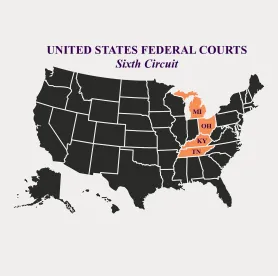Addressing whether purported trade secret information ought to remain under seal on appeal, the US Court of Appeals for the Sixth Circuit ruled in a one-judge order that the Defend Trade Secrets Act (DTSA) provided a statutory basis that overcame the presumption of public access. Magnesium Machine, LLC v. Terves, LLC, Case No. 20-3779 (6th Cir. Dec. 10, 2020) (McKeague, J.)
This case presented the issue of what part of a record may be sealed on appeal—normally a routine question—in litigation that was anything but routine. According to the verified complaint, Magnesium Machine discovered a particular salt-based treatment for use on oil and gas tools. According to Magnesium, in the course of litigating a patent infringement suit against one of Magnesium’s suppliers, Terves and its counsel, McDonald Hopkins, obtained information reflective of Magnesium’s alleged trade secret from a third party pursuant to subpoena. Specifically, Magnesium claimed that particular language in a settlement agreement disclosed Magnesium’s trade secrets. The settlement agreement had been produced by the third party without any confidentiality designation. The complaint alleged violations of the federal DTSA and Oklahoma and Ohio state trade secrets acts.
Invoking the seizure provisions of the DTSA, Magnesium sought and obtained an ex parte order directing the US Marshals to seize Terves’s electronic equipment, including devices at Terves’ president’s home. That order did not last long. Following an evidentiary hearing (in which Terves participated) the day after the order was issued, the district court vacated the seizure order because Magnesium had not demonstrated misappropriation of a trade secret.
To appeal, Magnesium requested express findings of fact and conclusions of law. The district court explained that Terves and its lawyers subpoenaed materials in good faith, that the settlement agreement was produced without restriction (such as a confidentiality marking), that Terves’s lawyers did not impermissibly share the settlement agreement with Terves employees and that upon objection by Magnesium, Terves deleted its copies of the settlement agreement. Thereafter, on motions to dismiss, the district court concluded that Magnesium failed to allege misappropriation and that the litigation privilege protected Terves’ counsel.
Terves sought and obtained attorneys’ fees against Magnesium and its counsel for proceeding in bad faith. The district court found that Magnesium had every reason to know that its claims were baseless, because it was “well aware at the time the suit was filed that Defendants had received the allegedly secret information through legitimate discovery means and that it was provided to them without description.” Moreover, claiming that a three-word phrase in the settlement agreement purportedly disclosed trade secret information was “an intentional exaggeration/misrepresentation.” Indeed, other public statements had provided far more detail than the purportedly secret phrase, according to the district court.
On appeal, although Terves contended that the purported trade secret did not qualify as a secret, in the exercise of caution and on Magnesium’s request, Terves nonetheless sought to file a brief under seal. Judge David McKeague, acting on behalf of the Sixth Circuit, agreed that it was appropriate to seal the information, particularly in light of the courts’ obligation under the DTSA to take action necessary to preserve the confidentiality of trade secrets. Judge McKeague did not analyze whether the redacted information was indeed a trade secret. Rather, he accepted (for purposes of seceding the seal issue) that it was.
Although the Court recognized the public’s right to access, and reaffirmed the narrowness of categories of appropriately sealed information, it concluded that the protection of trade secrets is of paramount importance. However, the Court expressly left open the possibility that if the redacted information is not indeed a trade secret, the information would be unsealed at a later time.




 />i
/>i

